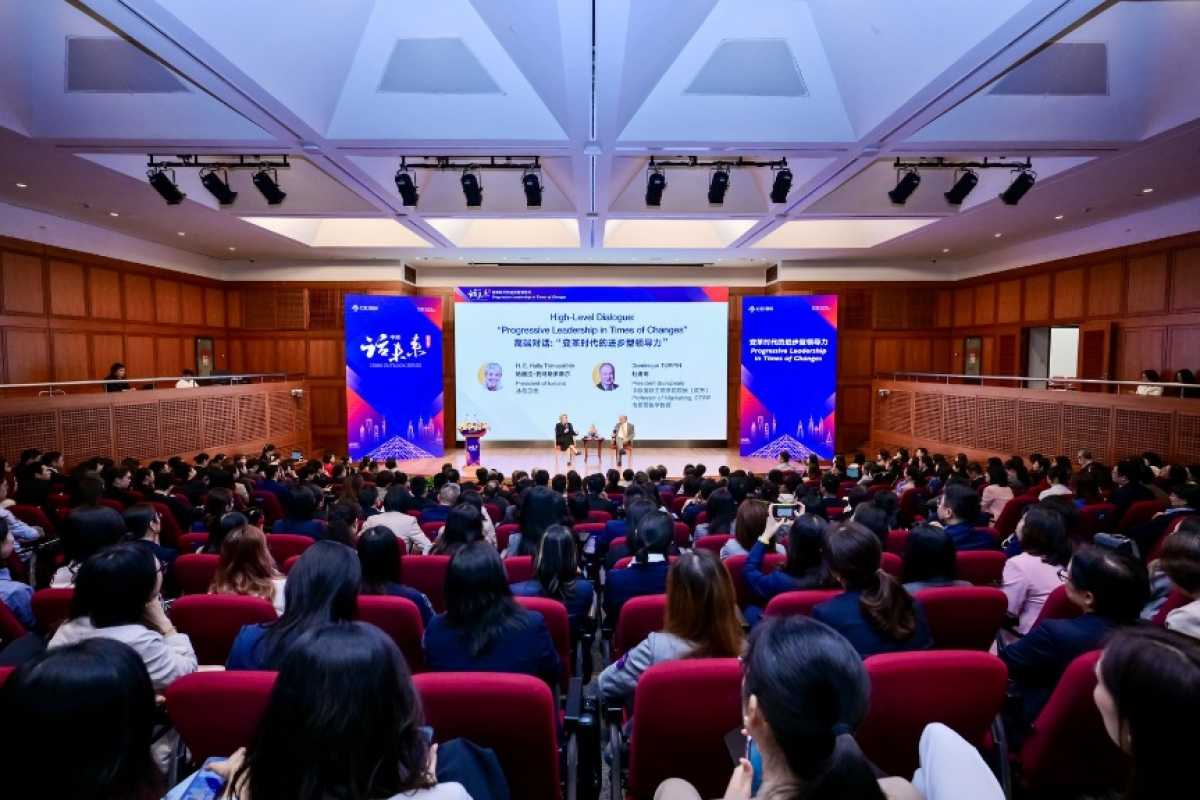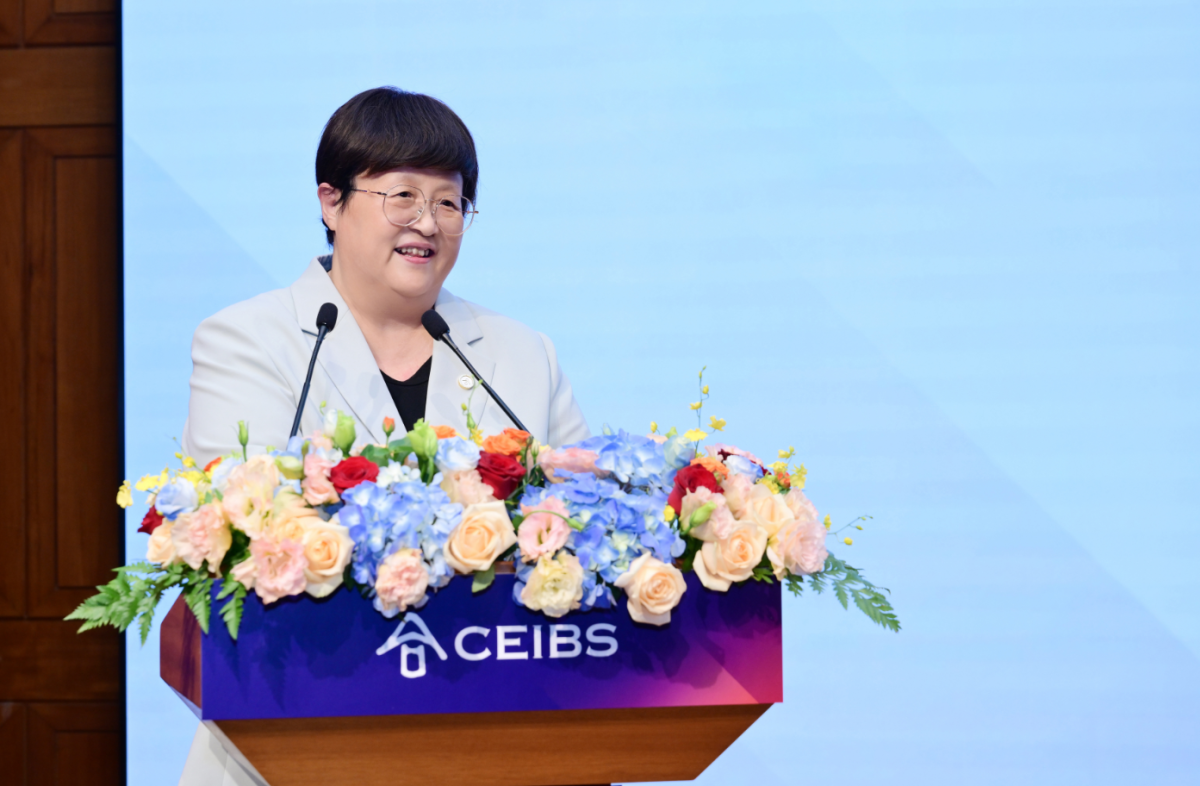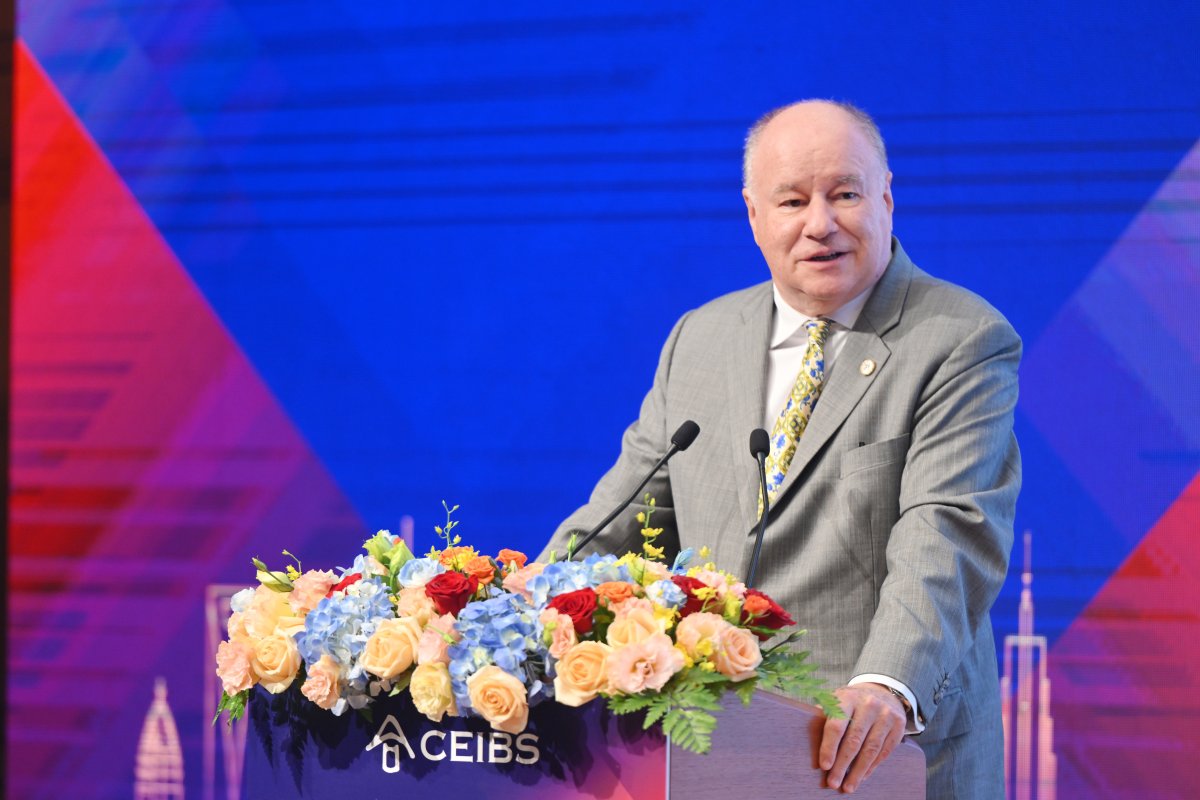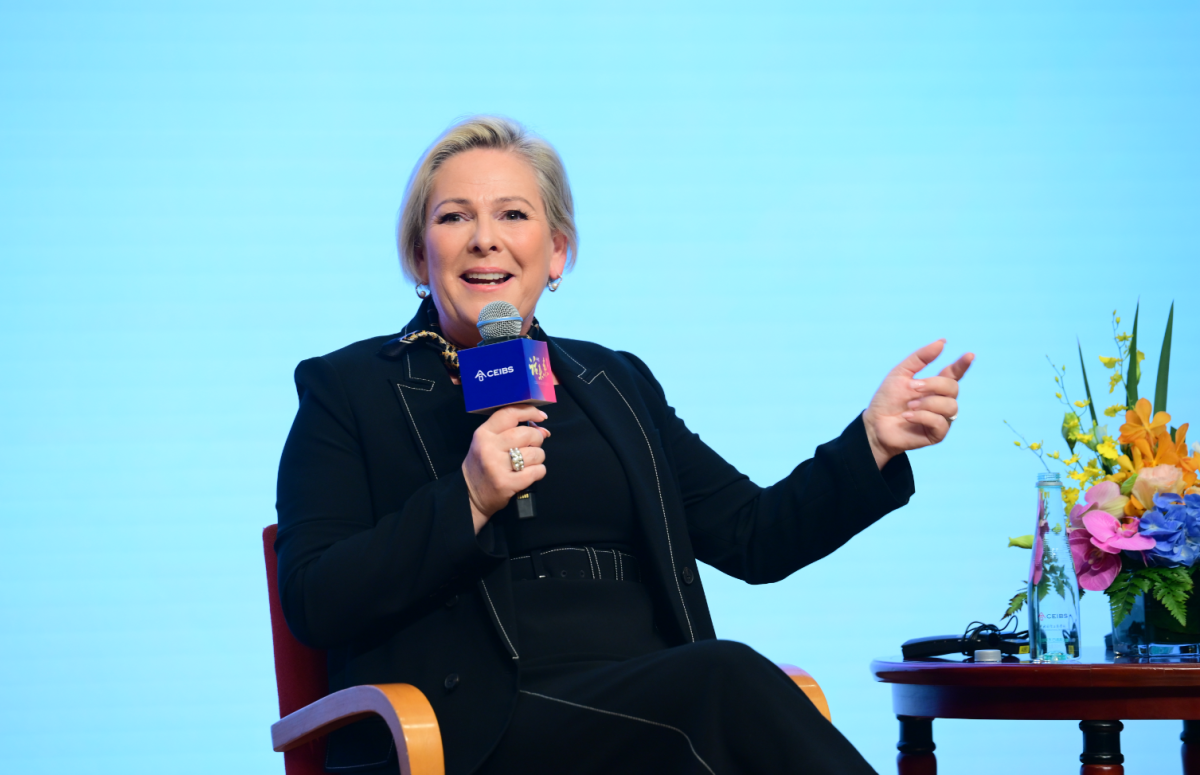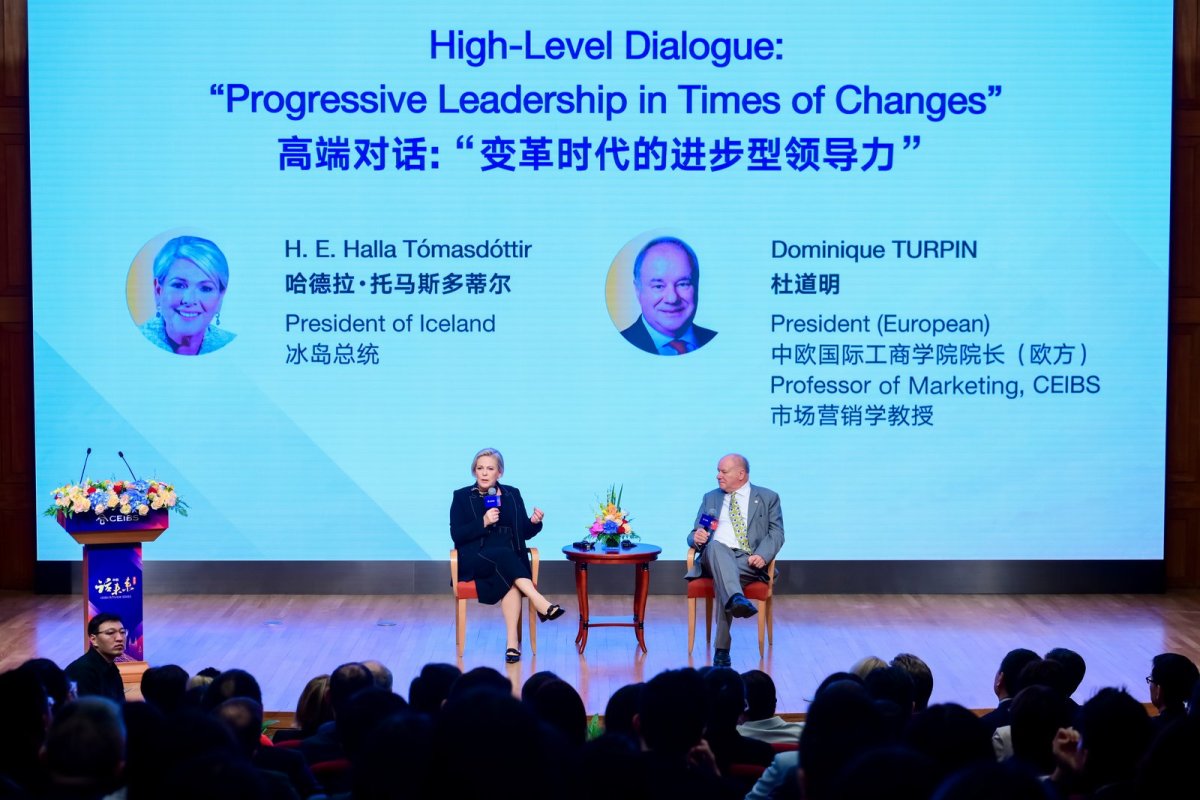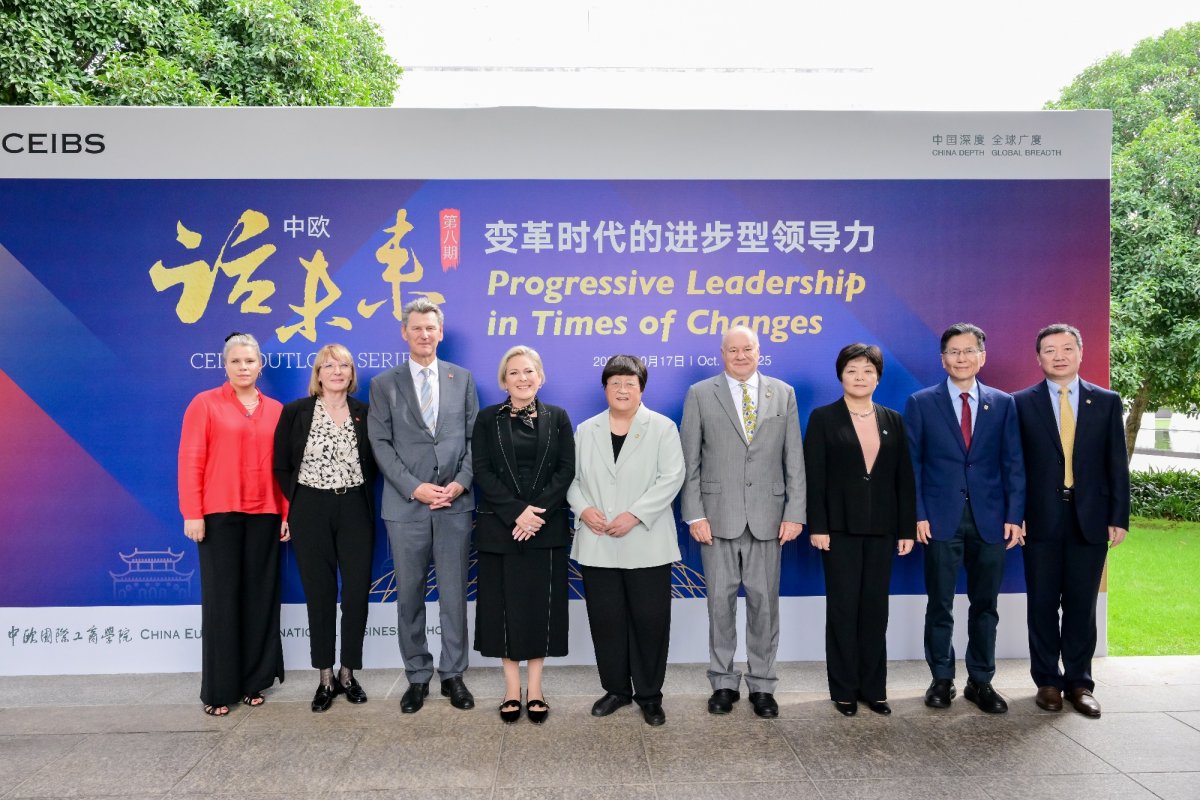President of Iceland Halla Tómasdóttir visits CEIBS for dialogue on “Progressive Leadership in Times of Changes”
October 17, 2025. Shanghai – China and Iceland possess complementary strengths and large potential for collaboration despite their vast difference in size, according to remarks made by President of Iceland Halla Tómasdóttir during an event on the CEIBS Shanghai campus today. President Tómasdóttir was accompanied by Thórir Ibsen, Ambassador of Iceland to China.
President Tómasdóttir was speaking at an edition of the CEIBS Outlook Series on the theme “Progressive Leadership in Times of Changes”. The event took the form of a dialogue between President Tómasdóttir—a globally respected leader in sustainable development, innovation, and gender equality—and CEIBS President (European) Professor Dominique Turpin, during which the two discussed how leaders can foster resilience, vision, and ethical practice to navigate complex challenges and drive meaningful change amid drastic global shifts.
The event began with welcome remarks from CEIBS President Wang Hong, who highlighted the strong ties between Iceland and China in areas such as green development, innovation, and cultural exchange. “The theme of today’s forum aligns closely with CEIBS’ longstanding educational philosophy,” she said. “In an era defined by challenges and rapid change, the mission of education is not merely to impart knowledge but to cultivate foresight; not merely to inspire wisdom but to nurture responsibility; and not merely to develop talent but to lead the future.” President Wang expressed confidence that President Tómasdóttir’s personal experience and profound insights would broaden participants’ perspectives, inspiring new ideas and fresh vitality. She also emphasised that Iceland and China have already forged a deep friendship and expressed hope that CEIBS and Iceland would further strengthen collaboration in management education, sustainable development, and green innovation—working together to build a more inclusive, intelligent, and sustainable world.
Prof. Turpin then took to the stage to introduce President Tómasdóttir, highlighting her unique personal, professional, and political story as a former entrepreneur, investor, CEO of the Iceland Chamber of Commerce, co-founder of Reykjavik University, and former head former head of an international non-profit organisation. “Her remarkable leadership journey reflects courage, resilience, and a commitment to creating a positive impact for the world,” Prof. Turpin said. “As a school, CEIBS also shares this commitment.” He added that Iceland had a lot to teach other nations of the world about sustainable development, noting that despite its relatively small population, the country has produced major achievements in terms of sustainability, gender equality, environment, governance, and human development, and highlighting that the United Nations (UN) regularly places Iceland in the top three of its Human Development Index.
President Tómasdóttir was then welcomed to the stage to engage in dialogue with Prof. Turpin. Prof. Turpin began by asking President Tómasdóttir for her insights into how Iceland has achieved its impressive development over the past decades. President Tómasdóttir replied that “Iceland is, I think, quite unique in two forms of energy that have powered our progress; the first, and one that we have talked a lot about during our visit in China, is geothermal energy.” She went on to explain how Iceland began utilising geothermal energy, which is critical to the energy transition needed to combat climate change, ahead of many other nations in the 1970s, which has been critical to the country’s success.
Outlining the second form of “energy” which has been crucial to Iceland’s development, President Tómasdóttir said that, in terms of gender equality, Iceland had “ranked number one according to the World Economic Forum and many other indexes for nearly two decades; so, I like to call that girl power.” She concluded, “I would say these are the two forms of energy that have brought Iceland to ranking at, or towards, the top on most metrics that matter, from GDP to well-being and happiness.”
When asked about Iceland’s relations with China, President Tómasdóttir first replied with two key words: friendly, and constructive. “It's interesting that Iceland was the first western European country to recognise China as a market economy,” she continued. “We were the first European country to develop a free trade agreement over a decade ago. We enjoy very positive trade and tourism relations.”
Expanding on Sino-Icelandic relations today, President Tómasdóttir said, “I think we have more in common than we realise. But more importantly, I think we have complementary strengths.” She highlighted geothermal energy as a key area of past and potential cooperation, noting Iceland’s past initiatives in training Chinese experts in the field and a joint venture by the two countries, through Arctic Green Energy and Sinopec, that supplies millions of people in China with heating and energy.
“China has this excellence in long-term planning and executing, often ahead of time,” she added. “So, I think this is a partnership that holds great complementary strengths, if we're smart enough to use it to the advantage of both of our countries.”
Following further discussion, Prof. Turpin then opened the floor to questions from the audience, including CEIBS faculty, alumni, and current MBA participants. President Tómasdóttir offered insightful responses to questions about leadership, the future of work in the age of artificial intelligence, and how enterprises can effectively foster equality in the workplace. Offering advice for future business leaders, she emphasised humility as crucial, before concluding, “humility without courage gets you nowhere, but courage without humility is arrogance.”
This instalment of the CEIBS Outlook Series represented an important opportunity for CEIBS to celebrate the relationship between Iceland and China, two countries which have had diplomatic relations for over 50 years. As a dialogue with the head of state of a vital European nation, it also embodied the school’s continuing efforts to facilitate meaningful exchange between China and the whole of Europe.







